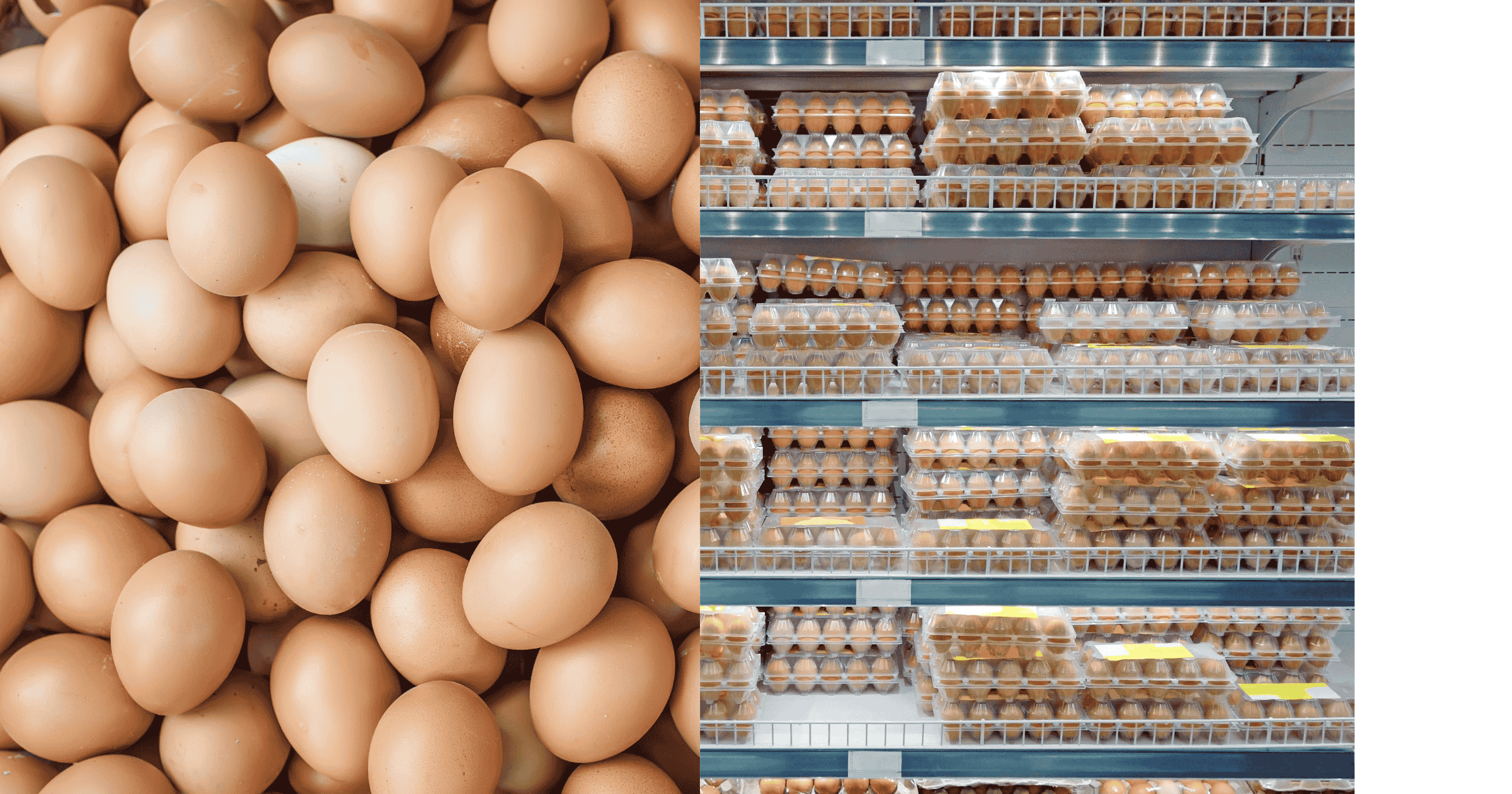
08 Apr Farm Eggs vs. Store Eggs for Cake Baking | Which Is Better?
When it comes to baking cakes, one of the most important ingredients you’ll use is eggs. Eggs play a crucial role in the structure, texture, and flavor of baked goods. While eggs are a common staple in every kitchen, the type of eggs you use—farm eggs versus store-bought eggs—can significantly affect the outcome of your cake.
In this blog post, we’ll compare farm eggs and store-bought eggs for cake baking, exploring the flavor, texture, and nutritional value of each. By the end of this post, you’ll have a clearer idea of which eggs are best suited for your next cake-baking adventure.
1. The Difference in Flavor: Farm Eggs vs. Store Eggs
One of the most noticeable differences between farm eggs and store eggs is their flavor. Fresh, farm eggs have a richer, more pronounced taste due to the way the chickens are raised and the diet they consume.
- Farm Eggs: These eggs are laid by hens that are often free-range or pasture-raised. As a result, they are fed a more varied diet, including grains, insects, and greens, all of which contribute to a deeper, richer flavor in the yolk. The yolk of a farm egg tends to be more golden-yellow or orange, which can result in a more flavorful cake.
- Store Eggs: Most store-bought eggs come from hens that are kept in large commercial farms, often in confined spaces, and fed a standard, processed diet. These eggs are typically lighter in color and have a milder, less intense flavor. Cakes made with store eggs may not have the same depth of flavor, making them taste more neutral compared to those baked with farm eggs.
For cakes, flavor matters. Using farm-fresh eggs can give your cake an extra boost of richness, enhancing the overall taste and making it stand out.
2. Impact on Texture: Farm Eggs vs. Store Eggs in Baking
The texture of your cake is another key factor influenced by the type of eggs you use. Eggs help with the rise and structure of baked goods, and using farm eggs versus store eggs can yield slightly different results.
- Farm Eggs: Due to the fresher, more nutritious diet of the hens, farm eggs tend to produce a richer, moist cake with a fluffier texture. The whites of farm eggs are firmer, while the yolks are more vibrant and creamy. These qualities contribute to a cake with better moisture retention and lighter crumb.
- Store Eggs: Store eggs, being mass-produced, often have a more standardized composition. While they still provide the necessary binding and structure for cake batter, they don’t always result in the same level of moisture or fluffiness as farm eggs. The whites may not whip up as easily, and cakes may have a slightly denser or dry texture, especially if overbaked.
In cakes where texture is crucial (such as sponge cakes, chiffon cakes, and angel food cakes), farm eggs give a more light and airy result compared to store eggs, which might produce a heavier cake.
3. Nutritional Value: Farm Eggs vs. Store Eggs for Baking
Another important factor to consider when choosing eggs for baking is the nutritional content. Farm eggs are often richer in nutrients, providing more omega-3 fatty acids, vitamin D, and antioxidants compared to store eggs.
- Farm Eggs: Hens that are allowed to roam freely and forage for their food produce eggs that have higher levels of omega-3 fatty acids, which are beneficial for heart health. These eggs also contain more vitamin E and beta-carotene—both of which contribute to better overall health. Additionally, because the hens are raised in more natural conditions, their eggs are often lower in cholesterol.
- Store Eggs: Store eggs, on the other hand, come from hens that are typically confined to small cages and fed a grain-based diet. As a result, store eggs have lower amounts of omega-3 fatty acids and may be lower in other vitamins like vitamin D. While still nutritious, store eggs are not as rich in beneficial nutrients as farm eggs.
For bakers looking to make their cakes not only delicious but also nutritious, using farm eggs can be an excellent choice. Plus, the vibrant yolks often present in farm eggs make your cakes look more appealing!
4. Shelf Life: Farm Eggs vs. Store Eggs
When it comes to shelf life, there’s a significant difference between farm eggs and store eggs. The freshness of the eggs will affect how long they last in your kitchen and how they perform in your baking.
- Farm Eggs: These eggs are typically fresher since they come from local farms and often have a shorter shelf life. However, farm eggs are better for immediate use in recipes, especially for those looking for the best flavor and texture. They will last for about 1-2 weeks in the fridge, but for optimal results, it’s best to use them sooner.
- Store Eggs: Store eggs are generally processed, cleaned, and packaged for longer shelf life, making them more suitable for storage. They can last for several weeks in the fridge and still perform well in most baked goods. However, due to the longer shelf life, store eggs might lose some of their freshness, which can affect the flavor and texture of cakes.
If you plan on baking regularly and need to store eggs for a longer period, store eggs may be more convenient. But for the best baking results, especially for special occasions or important cakes, farm eggs should be your first choice.
5. Cost and Availability: Farm Eggs vs. Store Eggs in Nigeria
The cost of eggs can be an important factor in deciding which eggs to use for baking, particularly for large batches. In Nigeria, store eggs are typically more affordable and widely available in supermarkets, making them a popular choice for everyday baking. However, farm eggs may be slightly more expensive, especially if you are purchasing from local farmers or markets, due to their fresher quality and organic production methods.
While farm eggs are often preferred by bakers for the best flavor and texture, store eggs can still deliver good results, especially for everyday baking or when you’re on a budget.
6. Which Eggs Are Best for Cake Baking?
So, which eggs should you choose for baking cakes? It depends on what you prioritize:
- If flavor, texture, and nutritional value are your top priorities, farm eggs are your best bet. They will make your cakes tastier, lighter, and more moist, with the added benefit of being nutrient-dense.
- If you’re baking on a budget or need eggs for large batches, store eggs are still a solid choice. While they may not provide the same depth of flavor or texture as farm eggs, they are widely available and affordable.
Ultimately, farm eggs will give you the best cake-baking experience, but store eggs can still be used for good results in everyday baking.
Conclusion
Both farm eggs and store eggs have their pros and cons when it comes to cake baking. Farm eggs provide superior flavor, texture, and nutritional value, making them the ideal choice for serious bakers who want the best results. However, store eggs can still deliver decent results at a lower cost, making them suitable for more casual or budget-friendly baking.
Next time you’re making a cake, consider the difference farm eggs can make and see how they elevate your recipes to the next level. Happy baking!
Which eggs do you prefer for cake baking: farm eggs or store eggs? Let us know in the comments below!
Recent posts
- How to Make Akara and Moi Moi with Farm Eggs | Delicious Nigerian Recipes
- How to Make Perfect Omelettes with Farm Eggs | Easy, Delicious Recipe
- Easy Egg Salad Recipes with Farm Fresh Eggs | Delicious & Nutritious
- Deviled Eggs with Local Nigerian Ingredients | Easy Recipe
- Delicious Nigerian Dishes Made with Eggs | Tasty Egg Recipes
Your cart
Your cart is currently empty!








No Comments